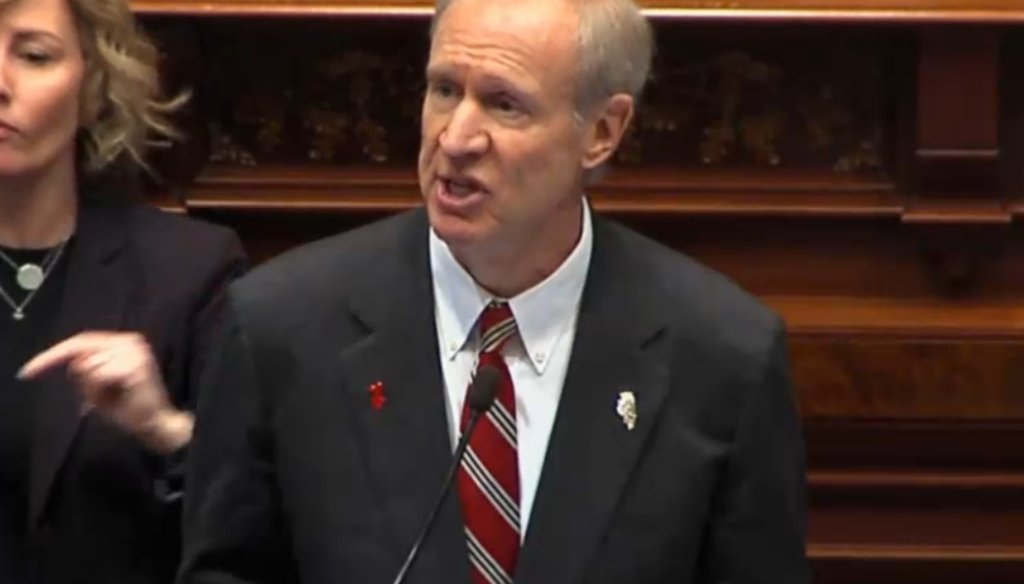

Our only agenda is to publish the truth so you can be an informed participant in democracy.
We need your help.


Illinois Gov. Bruce Rauner speaks to the General Assembly in 2017.
Illinois Gov. Bruce Rauner has been pushing for changes to the state’s pension funds since he first began running for governor in 2013. His proposed FY 2016 budget suggested moving all state employees into a pension plan with lower benefits. He moved away from that approach once the Illinois Supreme Court declared unconstitutional a law that sought changes to pension benefits.
He hasn’t, however, stopped blaming the Illinois General Assembly, with its Democratic majorities, for contributing to the state’s mushrooming pension debt. As he launched an extended media crusade this year, Rauner said legislators who approved pension contribution breaks from 2005 to 2009 cost state workers and taxpayers billions.
"The status quo led the General Assembly to reduce pension payments four straight years starting in 2005," Rauner wrote in Springfield’s Capitol newspaper, "costing billions of dollars as the delay in contributions essentially borrowed from pension funds at a very high interest rate."
For several years now, Illinois has had the dubious distinction of having the worst pension debt in the nation. Illinois’ current debt was listed at $129.8 billion in November by the state General Assembly’s bipartisan Commission on Government Forecasting and Accountability.
We decided to dig in to Rauner’s claim that reducing payments cost billions and was like borrowing at high interest rate.
Borrowed time
A 2013 settlement Illinois officials made with the federal Securities and Exchange Commission confirms the reduced pension payments for the four years in question, said Laurie Cohen, senior analyst with the Institute for Illinois’ Fiscal Sustainability at the Civic Federation, a nonpartisan government finance research group.
The SEC said that despite state claims that pension holidays would be offset by increased fund contributions from 2008 to 2010, a 2005 amendment allowed lawmakers to skip increasing contributions to make up for the pension contribution holidays.
The SEC settlement document underscores Rauner’s claim that the delay in contributions exacerbated the state pension funds’ condition. "Although the State disclosed the basic fact of these reduced contributions," it reads, "the State did not disclose that each of these deviations exacerbated the Structural Underfunding, deferred contributions further into the future, impaired the ability of the State to meet its pension obligations, and negatively impacted the State’s creditworthiness."
Daniel Hertz, a senior policy analyst with the progressive Center for Tax and Budget Accountability, agreed Rauner’s claim was supported by the facts.
In an email, Hertz said, "The legislation Rauner referenced did have the effect of reducing pension contributions below what they otherwise would have been for four years, and that additional underfunding was, essentially, borrowing that increased costs down the line."
According to a 2006 COGFA report, Hertz said, "the net effect of the law was to increase pension payments from the State by $6.8 billion between FY2006 and FY2045."
Our ruling
In an opinion piece published by a Springfield newspaper, Republican Gov. Bruce Rauner said lawmakers in the Illinois General Assembly authorized reduced pension payments from 2005-2009. He said those lowered contributions cost billions and were akin to borrowing from the funds at a high interest rate.
The General Assembly’s own finance agency and a federal settlement with the SEC confirms four years of reduced contributions. The SEC said the move aggravated the funds’ condition and ability to meet its obligations and worsened its creditworthiness. A 2006 report said the underfunding required $6.8 billion more in payments.
We rate this claim True.
https://www.sharethefacts.co/share/c0969e8c-099a-4ec2-90cd-9a49fd31d4a4"Gov. Bruce Rauner: It's time to set Illinois on a path for success," The State Journal-Register, Dec. 31, 2017, accessed Jan. 6, 2017
Email, Catherine Kelly, press secretary, Gov. Bruce Rauner, Jan. 7, 2017.
SB0027, 94th General Assembly, http://ilga.gov/legislation/billstatus.asp?DocNum=0027&GAID=8&GA=94&DocTypeID=SB&LegID=14658&SessionID=50&SpecSess=, accessed Jan. 7, 2017, Feb. 15, 2017
Email, Laurie Cohen, senior analyst, Institute for Illinois’ Fiscal Sustainability, The Civic Federation, Feb. 7, 2017
"Administrative Proceeding: State of Illinois," Securities and Exchange Commission settlement document, March 11, 2013, accessed Feb. 7, 15, 2017
"Special Pension Briefing," November 2106, Commission on Government Forecasting and Accountability, accessed Feb. 15, 2017
"Supplemental Digest to Retirement Systems’ Audit," Office of the Auditor General, accessed Feb. 16, 2017
Email, Daniel Hertz, senior policy analyst, Center for Tax and Budget Accountability, Feb. 9, 2017
"Commission on Government Forecasting and Accountability Monthly Briefing," August 2005, pps. 19-26, Commission on Government Forecasting and Accountability, accessed, Feb. 15-16, 2017
"Wealthy Bruce Rauner announces for Republican governor race," Chicago Tribune, accessed Feb. 15, 2017
In a world of wild talk and fake news, help us stand up for the facts.
